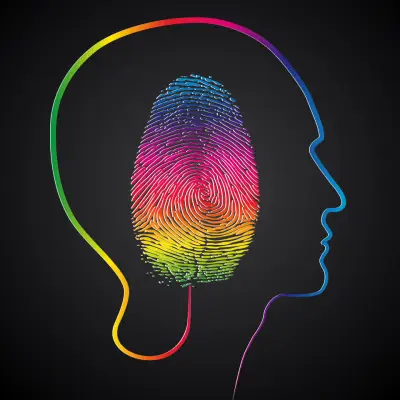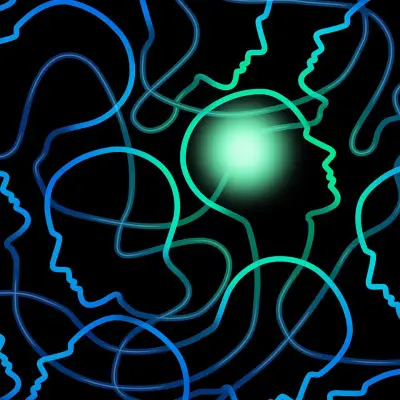Fear of rejection is a common human experience. It's a deeply rooted emotion that can influence your behaviour, choices, and relationships in many ways. Understanding and overcoming this fear is essential for growth, happiness, and healthier relationships. This post will explore what fear of rejection entails, its impact, and practical steps to manage and overcome it.
Jump to:
What is Fear of Rejection?

The fear of rejection is the apprehension or anxiety about being turned away, dismissed, or deemed unworthy by others. It's a form of emotional distress that concerns the possibility of not being accepted, loved, or valued.
The roots of this fear often trace back to early experiences of parental rejection, feeling rejected by partners, or consistent rejection in relationships. These formative experiences can lead to rejection trauma, affecting your self-esteem and how you interact with others.
Fear of Rejection in Love and Relationships
In love and relationships, the fear of rejection can be particularly paralysing. It might lead to avoiding relationships altogether, misinterpreting signals as signs of rejection, or staying in unhealthy relationships due to a fear of being alone.
Recommended for you!
Best SellersPsychological Effects of Rejection

Rejection, whether real or perceived, triggers many psychological effects, including rejection sensitivity, rejection anxiety, and even rejection-sensitive dysphoria in some cases. These conditions manifest as intense emotional pain, affecting your mental well-being and daily functioning.
Overcoming Fear of Rejection in 6 Steps
Overcoming a fear of rejection is about transforming your relationship with rejection, turning it from a source of fear into an opportunity for growth. Here are six practical steps to help you navigate through this journey:
Step 1: Recognise the Fear
The first step in overcoming a fear of rejection is acknowledging its presence. Identifying specific situations that trigger this fear can provide valuable insights into its roots and how it affects your life. Be honest with yourself and recognise that this fear, while daunting, is a common experience that you can overcome.
Step 2: Reframe Your Thoughts
Learning to reframe your thoughts is a powerful tool in managing the fear of rejection. Instead of seeing rejection as a personal failure, try to view it as an opportunity for growth and self-discovery. Ask yourself, "What can I learn from this experience?" This shift in perspective can significantly reduce the emotional impact of rejection.
Step 3: Build Self-Esteem
A strong sense of self-worth is your shield against the fear of rejection. Engage in activities that make you feel good about yourself, and practise self-compassion. Remember, your value does not diminish because someone fails to see your worth. Investing in your self-esteem is not just about overcoming fear of rejection; it's about enriching your overall quality of life.
Step 4: Develop Emotional Resilience
Emotional resilience is the ability to bounce back from setbacks, including rejection. It involves accepting your emotions, allowing yourself to feel them fully, and then moving forward with a positive outlook. Developing resilience is like strengthening a muscle; the more you work on it, the stronger it becomes, enabling you to navigate life's challenges more effectively.
Step 5: Seek Support
You don't have to face your fears alone. Opening up to friends, family, or a therapist can provide support and perspective. Sometimes, just knowing that you're not alone in your feelings can be incredibly comforting. Supportive relationships are essential for emotional well-being, offering a sense of belonging and acceptance that counteracts feelings of rejection.
Step 6: Expose Yourself to Rejection
Ironically, one of the most effective ways to overcome the fear of rejection is to expose yourself to it. Start with small risks in areas of your life where rejection has a minimal impact and gradually build up your tolerance. This can help desensitise you to the fear and reduce its power over you. Each experience of facing rejection and surviving it chips away at the fear, teaching you that rejection, while unpleasant, is not the end of the world.
How to Handle Rejection in Relationships
While the experience of rejection is undoubtedly painful, it's important to remember that it's not a reflection of personal inadequacy. More likely, it's about incompatibility or the specific circumstances surrounding the relationship. Recognising this fact can help reduce some of the emotional burdens that come with feeling rejected.
One effective way to manage these feelings is through open communication with your partner or potential partners. Sharing your fears and insecurities can encourage a deeper understanding and intimacy between you. It's okay to express how you feel and what you're afraid of. You might be surprised to find that you're not alone in these feelings, and this shared vulnerability can strengthen your connection.
Moreover, learning to accept rejection as a part of life's journey is essential. Rejection does not define your worth or dictate your future. In fact, each experience of rejection can be seen as bringing you one step closer to where you're meant to be. It's a part of the process of finding compatibility and mutual happiness, serving as a guidepost rather than a roadblock. Embracing this perspective can transform how you approach relationships and rejection, leading to a healthier, more resilient approach to navigating the complexities of love and connection.
The Role of Professional Help

- Therapy: For some, professional help may be necessary to overcome deep-seated fears. Therapies like cognitive behavioural therapy (CBT) are effective in addressing fear of rejection and associated anxieties.
- Considering Medication: In cases where fear of rejection coexists with other mental health issues, medication may help. Always consult a healthcare professional for advice tailored to your specific needs.
- Moving Forward: Overcoming the fear of rejection is a journey of self-discovery and growth. It's about learning to value yourself, embracing vulnerability, and realising that rejection, while part of life, doesn't define your worth or future.
Common Questions About Overcoming a Fear of Rejection
Can the Fear of Rejection Lead to Physical Symptoms?
How Can I Tell if My Child is Experiencing Fear of Rejection?
Children might not always verbalise their fears directly. Signs that a child is dealing with fear of rejection include reluctance to try new activities, hesitation in making friends, or distress in situations where they might be evaluated or judged. A supportive and understanding environment is essential for helping them navigate these feelings.
Does Fear of Rejection Worsen With Age?
The impact of fear of rejection depends more on individual experiences and coping mechanisms than age. Some people may find that their fear lessens as they gain more life experience and build resilience. Others might struggle with it consistently, regardless of age, especially without effective strategies to manage it.
Is It Possible to Completely Eliminate Fear of Rejection?
While it may be challenging to completely eliminate fear of rejection, it is certainly possible to significantly reduce its impact. By developing a healthier relationship with rejection, one can learn to view it as a normal part of life, reducing its ability to cause distress.
How Does Social Media Affect Fear of Rejection?
Social media can amplify feelings of rejection, given its focus on approval and validation through likes, comments, and shares. It's important to cultivate a balanced perspective on social media interactions, remembering that they represent only a small, often curated part of reality.
Can Fear of Rejection Affect Career Progression?
Fear of rejection can hinder career progression. It might stop someone from applying for new positions, seeking promotions, or contributing ideas in meetings because they fear criticism or dismissal. Addressing this fear can open up new professional opportunities and lead to greater job satisfaction.
What Role Does Self-Talk Play in Overcoming Fear of Rejection?
Positive self-talk is a powerful tool in combating the fear of rejection. By challenging negative thoughts and beliefs about yourself and replacing them with affirming and supportive messages, you can build self-confidence and resilience against rejection.
Are There Specific Exercises to Help Overcome Fear of Rejection?
There are exercises that can help, such as writing down fears and challenging them with evidence, practising mindfulness to stay present and reduce anxiety, and role-playing scenarios to build confidence in handling potential rejections.
How Can I Support Someone Who is Struggling With a Fear of Rejection?
Being a supportive listener is key. Encourage them to express their feelings, validate their experiences, and gently encourage them to take small steps towards facing their fears. Offering to accompany them in challenging situations can also provide a sense of security and support.
Recommended for you!
Best SellersNavigate Relationships With Centre of Excellence
If you're keen to understand and overcome the fear of rejection, particularly in relationships, our Relationship Psychology Diploma Course will help. It offers the tools to understand relationships in detail, making them easier to navigate.
- Why Centre of Excellence?
- Inclusivity: We believe in making transformative education accessible to all, reflected in our competitively priced courses.
- Learn on Your Terms: Our courses are designed for maximum flexibility, allowing you to study at your own pace and seamlessly integrate learning into your life.
- Dedicated Support: Enrolment comes with personalised tutor support and access to a community of like-minded individuals, providing a nurturing environment for your learning journey.
Special Offer
We're excited to offer our Relationship Psychology Diploma Course at an exceptional discount, available now for only £29.












